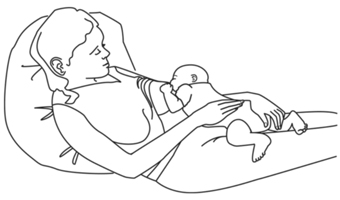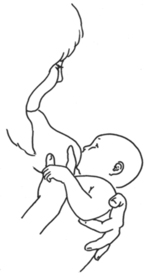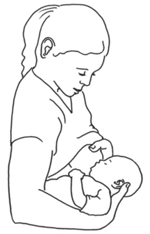Breastmilk is the best food for babies. It helps them grow and protects them from many health problems. It is best for moms, too. It helps you get back in shape. It lowers your risk of breast cancer. And it helps you form a close bond with your newborn. Most mothers can breastfeed with patience and persistence. You can get help getting started.

How Often Should I Feed My Newborn?
Feed her when she is hungry, not on a schedule. Watch for signals that she is hungry. She may suck her hand or try to nurse. Then she may start to cry. Most newborns need to nurse every 1 to 3 hours during the day and at night.
Is Your Baby Getting Enough Milk?
Keep track of your baby’s diapers. If your baby has 4 to 6 wet disposable diapers (or 6 to 8 cloth) and 3 to 4 poopy diapers in 24 hours, that usually means she is getting enough breastmilk.
Breastfeeding Positions
Laid Back
Lie back with good back support. Your baby faces you, tummy-to-tummy, and her mouth is on top of your breast. This is a good position for babies learning to breastfeed
Cradle Hold
Hold your baby across your stomach, with his head in the bend of your elbow. You and your baby are tummy to tummy. You can also support your baby with your other arm.
Side Hold
Place your infant on a pillow at your side and use one hand to bring her head to your breast. This position is good for small babies or mothers who have had a C-section.
Tips for Breastfeeding
- Sit where you have good back support.
- Make sure your baby’s head, shoulders and hips are all facing you—so she does not have to turn her head to nurse.
- Your baby’s mouth should cover the areola, the dark area around the nipple
- Feed on one breast until it is empty—about 10 to 20 minutes. Then burp your baby and switch breasts.
- If your breasts are swollen and tender, or they leak, try to breastfeed more often. Or try warm compresses or a hot shower before you breastfeed.
- If you still have sore nipples after the first few weeks, your baby may not be latching on right. Talk to your doctor or a breastfeeding expert. Contact WIC or La Leche League.
If You Need Help to Breastfeed or Get Formula
A lactation consultant, midwife or doula can help you start breastfeeding in the hospital. For advice and classes on breastfeeding, contact La Leche League, Arizona Breastfeeding Hotline or WIC. WIC also has coupons for infant formula.
THINGS YOU CAN DO
Prepare for Breastfeeding When You Give Birth
- Have your baby lie skin-to-skin on your chest after the birth. Many babies start breastfeeding within an hour.
- Make sure your baby stays in the hospital room with you.
- Your first milk, called colostrum, is extra rich.
- Do not offer a bottle or pacifier. This makes it harder for a baby to learn to breastfeed.
While You Are Breastfeeding
- Ask your doctor if you should keep taking prenatal vitamins. And ask if your baby needs extra vitamin D while you breastfeed.
- If you take any medicine, ask your doctor if it is safe to take while you are breastfeeding.
- If you think something you eat is upsetting your baby, try not to eat it for a while. If the problem does not go away, talk to your doctor.
Breastfeeding Tips for Working Moms
- Breastfeed through your maternity leave. Then breastfeed before and after work.
- You can use a breast pump or express your milk by hand. See if there is a private room at your job that you can use.
- You can refrigerate breastmilk for up to 3 days.
- You can freeze it for 3 to 6 months. Thaw it in the refrigerator.
- For information on breast pumps, contact La Leche League or WIC.
The First Things First Parent Kit was developed in partnership with Health Research for Action/UC Berkeley. © 2018 The Regents of the University of California. Additional video, graphic and other content © 2018 First Things First. All rights reserved.


